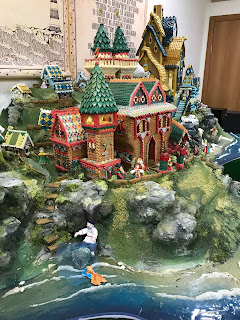I last wrote that my next blog would be more fun, less heavy than the last two. That was two months ago. It's not that nothing fun has happened here. That's not why this blog post is an entire month late. I worked on it a month ago to get it out on time, then ran into computer problems (as usual) and walked away in a huff (as usual). In the meantime, Douglas was away for training for a week and I met up with him in Moscow . . . excuses, excuses. I know. Anyway, I have a friend, Alexander, who has promised to help me improve my blog. Technically. There's nothing he can do about the writing, that's on me. We keep trying to get together, but it hasn't happened yet. I've included some videos. I hope they work. If they don't, that is something that Alexander will one day help me with. So, my apologies for skipping the month of November. Here's the fun blog I promised.
One of my favorite places to go in Vladivostok is Russky Island. It's just a bridge-span from the mainland. The sisters from the church where I sing live there in an old building that housed officers for the Russian navy under the tzar. There are ruins on the island that look like they may have been old armories. Russky Island is home to Far Eastern Federal University and the medical complex associated with it. About a month ago, I got up early to join a friend to watch the sunrise and hike on the island.
Sunrise on Russky Island
Great views on the hike. (Not me-what's behind me!)
Something you don't see every day.
Considerate hikers preceded us!
The view from the top.
One more good view from the hike.
Douglas and I went hiking on the island on one of his (rare) days off, and we stumbled onto a labyrinth. What a surprise, and what a treat! Strewn among the stones were coins, shiny kopecks. I felt like I was in a dream, as I occasionally dream of finding a coin, then I see another, and another until I realize that the ground is covered with coins. We walked the labyrinth, then left a stone atop another before leaving. Then we went to one of our favorite restaurants for lunch, Novik. They not only have a great menu, they gather their own honey and make their own mead.
The Russky Island Labyrinth (with one of the bridges in the background).
Vladivostok promotes the conservation of tigers. September 29 is
Tiger Day. People dress up like tigers, there’s a parade. It’s festive. In
2022, Vladivostok will host the International Tiger Summit. There is a safari
park nearby that began with the rescue of a single animal. (Forgive me for not
remembering the details; it’s been months since I was there, and the stories I
heard were in Russian, so I didn’t understand everything.) Someone found out that a man was caring for one, so another was brought, and so on. He wound up taking
on a job driving a cab in order to pay for the care of these animals. Word
spread and people began to donate. Eventually, he was able to buy enough land
to give the animals more space. Today, there are not only tigers there, but
also Himalayan Black Bears (also known as the Moon Bear or White Chested Bear),
deer, wild pigs of some sort, a leopard and cranes. The population changes over
time. They promote this place as not being a zoo where animals are in cages,
but that’s not true. The tigers are certainly caged, though the terrain is
natural and they might have more space than your average zoo. What is unique are the walkways over the spacious cages where we can look down on the tigers.
I don't think this tiger likes being stared at.
Vladivostok is nicknamed the San Francisco of Russia. It is full of hills - not as steep as those in San Francisco, but hills none the less. We live on one of them, which is why we have such a nice view of the bay and sunsets. The closest path to and from the Consulate is a road that we affectionately refer to as the Goat Path. It was apparently paved years ago, but has long fallen into disrepair. We recently found out that according to city statute, it is up to the neighbors on that road to maintain it. They don't. Here's a little video of me making my way down the Goad Path after a rain:
One of these days, I'll write an entire post about the Goat Path.
Have a blessed Advent everyone. Merry Christmas from Russia!

























